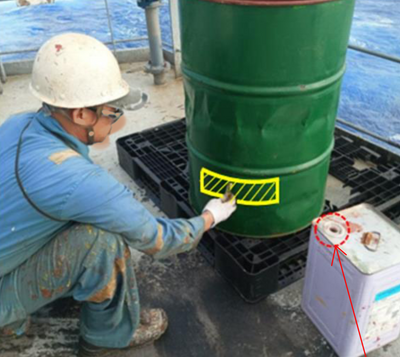202522 Burning plastic on deck causes fatality
As edited from report TIB/MAI/CAS.150 (Singapore)
A deck crew member was tasked to clear the accumulated shipboard plastic waste by burning it in an empty 200-litre oil drum on the poop deck. He was told to use only wastepaper as an accelerant.
Between about 10:30 and noon, the crew member burnt several bags of plastic waste in the drum, then stopped for lunch. After lunch, he returned to this task.
At about 1420, an explosion was heard, followed by the activation of the fire alarm on the bridge’s display panel, indicating a fire on the poop deck. The general alarm was sounded and an announcement made alerting the crew. The crew member who was burning plastic was engulfed in flames. Other crew members came to his assistance and the flames were extinguished. He was then taken to the ship’s hospital.
The victim explained that he had placed plastic waste inside the empty drum in preparation for burning, poured paint thinner over it, and placed the uncapped paint thinner tin beside the drum. He then ignited the plastic waste from the access hole at the bottom of the drum with a lighter (as in the re-enactment photo), resulting in an explosion which covered him in flames.
The Master contacted the CIRM for medical assistance and was advised on how to treat the victim. The victim’s condition deteriorated two days after the initial incident and the vessel was diverted to the nearest port. During the transit the victim’s condition continued to deteriorate, and a medical evacuation was mobilised. Unfortunately, the victim was later declared deceased on board by an attending doctor.
The investigation revealed critical lapses in communication between the vessel leadership and crew. The Master’s plan had been to dispose of the plastic waste at the next port. Although the Master had informed the Chief Engineer of this, other crew members, including the Chief Mate were not informed. The Chief Engineer had rejected a request to burn plastic waste using the shipboard incinerator, but did not provide a reason for doing so. The Chief Mate then felt obliged to find an improvised solution – by burning it on the poop deck in a barrel.
The burning of waste on an exposed deck was not approved by the Company’s SMS. Despite this, the Chief Mate instructed the crew to carry out the task, revealing a gap in adherence to established procedures. The crew did not question nor challenge this instruction despite knowing that the company SMS forbids burning on the exposed deck.

Lessons learned
- No subtstance should ever be burnt on an open deck. Always use the vessel’s incinerator for such tasks or, if the incinerator is unserviceable, store on board for shore disposal.
- This tragic accident exposes ISM weaknesses that are surely taking place on many vessels – particularly the difference between written rules and actual practices. The vessel’s leaders must set the example, but also crew must be well informed of ISM procedures to challenge a dangerous or unallowed practice.
- Communication is everything! In this case the lack of proper communication from vessel leaders led to the death of a crewmember.
